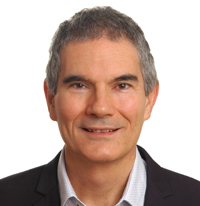 |
Associate Professor, IEEE FellowCo-Director Electrical Power Systems Integration Lab at NTU (EPSIL@N)Program Director Power Electronics, Energy Research Institute at NTU (ERI@N)School of Electrical and Electronic EngineeringNanyang Technological University, Singapore |
Josep Pou received the B.S., M.S., and Ph.D. degrees in electrical engineering from the Technical University of Catalonia (UPC), Barcelona. In 1990, he joined the faculty of UPC as an Assistant Professor, where he became an Associate Professor in 1993. At UPC, he was Director of the Power Quality and Renewable Energy (QuPER) group and the Terrassa Industrial Electronics Group (TIEG). From February 2013 to August 2016, he was a Professor with the University of New South Wales (UNSW), Sydney, Australia. In UNSW, he was technical research stream leader for the Solar Flagships Program Research Agenda, the result of AU$19-million investment from the Commonwealth Government of Australia in world class laboratories developed to study solar power conversion and its impact on the grid. He is currently an Associate Professor with the Nanyang Technological University (NTU), Singapore, where he is co-Director of the Electrical Power Systems Integration Lab @ NTU (EPSIL@N), and Program Director of Power Electronics at the Energy Research Institute @ NTU (ERI@N).
He spent two sabbatical years in the Center for Power Electronics Systems, Virginia Tech, USA, and one year in the Australian Energy Research Institute, UNSW, Australia. Since 2006, he has collaborated with Tecnalia Research & Innovation as a research consultant. He has authored over 230 published technical papers, is co-inventor of 7 patents, and has been involved in several industrial projects and educational programs in the fields of power electronics and systems. He has received 6 scholarship and fellowship awards, including the Endeavour Research Fellowship Award, sponsored by the Australian Government. His research interests include power electronics, multilevel converters, renewable energy generation, energy storage, power quality, and HVDC transmission systems.
He is IEEE Fellow, and Associate Editor of the IEEE Transactions on Industrial Electronics and the IEEE Journal of Emerging and Selected Topics in Power Electronics. He was Invited Editor of the Special Section on Hybrid Multilevel Converters for the IET Power Electronics.
The Modular Multilevel Converter
The modular multilevel converter (MMC) is an advanced converter topology that is changing the scenario of high-voltage direct current (HVDC) transmission systems. The MMC was first proposed in 2003 by Marquardt, and since then it has been an important focus of research for industry and universities. A three-phase MMC is integrated by six arms (two per phase-leg), each of them involving many cascaded submodules. The MMC offers an expandable and redundant configuration capable of generating a large number of voltage levels operating with high efficiency and reduced switching losses. This lecture will introduce the operation principles of the MMC and some recent research advances, including modulation techniques, capacitor voltage balancing and control techniques for the circulating currents.